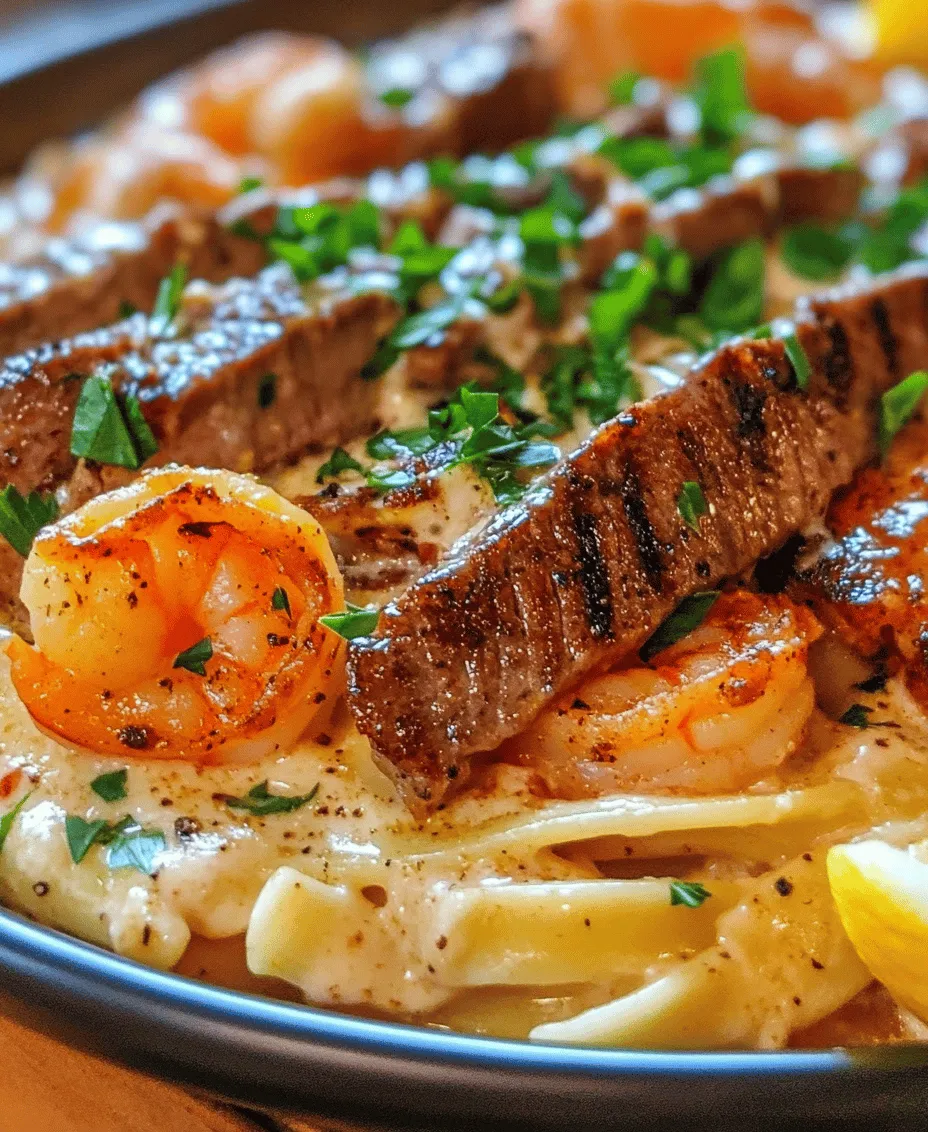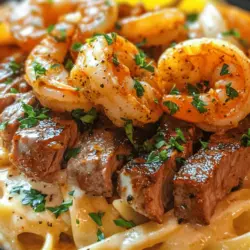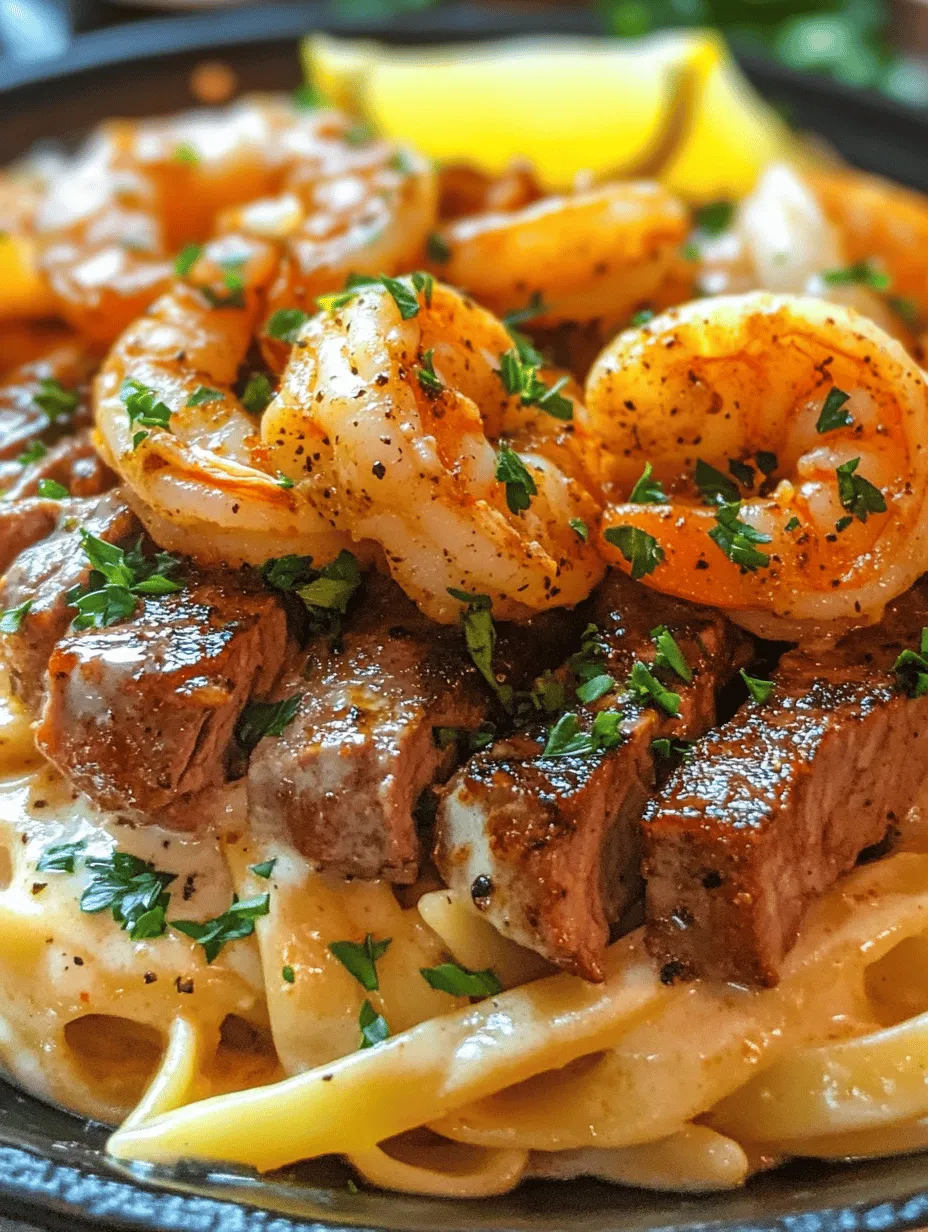Introduction
Cajun cuisine, with its roots in Louisiana, is renowned for its vibrant flavors, hearty ingredients, and a rich cultural heritage that blends French, African, Spanish, and Native American influences. Characterized by its bold spices and aromatic herbs, Cajun cooking celebrates the use of fresh ingredients to create dishes that are both comforting and exciting to the palate. One of the standout features of this culinary tradition is its ability to meld flavors that bring together land and sea, as seen in our delightful Cajun Shrimp & Steak Alfredo recipe.
This dish is a sumptuous fusion of two beloved proteins: succulent shrimp and tender steak, enveloped in a creamy Alfredo sauce that clings to perfectly cooked fettuccine pasta. The marriage of rich flavors with velvety textures exemplifies the essence of comfort food while offering an exciting twist that can elevate any dinner experience. The combination of Cajun seasoning adds a delightful kick, making every bite a flavorful adventure.
In this article, we’ll delve into the key ingredients that make this dish so special, as well as the preparation steps to ensure your Cajun Shrimp & Steak Alfredo is a resounding success. By understanding the components and techniques involved, you’ll be well on your way to impressing your family and friends with this delectable meal.
Understanding the Ingredients
To create the perfect Cajun Shrimp & Steak Alfredo, it’s crucial to understand the role of each ingredient in the dish. Below is a detailed description of the key components that contribute to the overall flavor and texture.
Fettuccine Pasta
Fettuccine is a flat, thick noodle that is traditionally made from flour and eggs. Its broad surface area allows it to hold onto sauces exceptionally well, making it an ideal choice for rich and creamy Alfredo sauces. The texture of fettuccine complements the hearty components of this dish, providing a satisfying bite. When cooked properly, fettuccine should be al dente—firm to the bite while still tender—and it provides a perfect base for our flavorful toppings.
Shrimp
When it comes to the shrimp, freshness is key. Using fresh, peeled, and deveined shrimp not only enhances the dish’s flavor but also simplifies the cooking process, allowing for a quick preparation. Shrimp cooks quickly and adds a burst of sweetness that balances the richness of the Alfredo sauce. Moreover, shrimp is a great source of protein and contains essential nutrients such as vitamin B12, iodine, and omega-3 fatty acids, making it a healthy addition to your meal.
Steak
For this recipe, you can choose between sirloin and ribeye steak, both of which offer distinct flavor profiles. Sirloin is leaner, delivering a firmer texture and a subtle beefy flavor, while ribeye is marbled with fat, providing a rich, juicy taste that melts in your mouth. The choice between these cuts ultimately depends on your preference for flavor and tenderness. Whichever you choose, ensure that the steak is of good quality, as it will greatly influence the overall taste of the dish.
Cajun Seasoning
Cajun seasoning is a key player in this recipe, bringing a depth of flavor that ties the dish together. Originating from the Acadiana region of Louisiana, Cajun seasoning typically includes spices such as paprika, cayenne pepper, garlic powder, onion powder, and black pepper. This blend not only adds heat but also contributes earthy and herbal notes that enhance both the shrimp and steak. You can use store-bought Cajun seasoning or create your own blend at home for a personalized touch.
Heavy Cream
Heavy cream is essential for creating the rich, luxurious Alfredo sauce that coats the pasta and proteins. Its high-fat content ensures a creamy consistency that clings beautifully to the fettuccine. When heated, heavy cream transforms into a velvety sauce that can be enhanced with cheese and seasonings. When making your Alfredo sauce, it’s important to balance it with the other ingredients to prevent it from becoming too heavy.
Parmesan Cheese
No Alfredo sauce is complete without Parmesan cheese. This sharp, nutty cheese adds flavor and thickness to the sauce. As the cheese melts into the heavy cream, it creates a creamy texture that enhances the dish’s overall richness. Freshly grated Parmesan is recommended for the best flavor, as pre-packaged cheese often contains anti-caking agents that can affect the sauce’s smoothness.
Fresh Parsley
Fresh parsley is not just a garnish; it plays a vital role in brightening the dish. Its fresh, slightly peppery flavor contrasts beautifully with the richness of the Alfredo sauce and the savory elements of the shrimp and steak. Chopped parsley adds a pop of color and freshness that makes the dish visually appealing and elevates its overall flavor profile.
Lemon Wedges
Finally, lemon wedges are a must-have accompaniment for this dish. The acidity of fresh lemon juice cuts through the richness of the Alfredo sauce, enhancing the flavors of both the shrimp and steak. A squeeze of lemon just before serving brings a bright, zesty note that balances the dish, making it even more enjoyable.
Preparation Steps for Cajun Shrimp & Steak Alfredo
Now that you have a thorough understanding of the ingredients involved in creating Cajun Shrimp & Steak Alfredo, it’s time to dive into the preparation steps. Each step is crucial for achieving a perfect dish, and we’ll provide tips along the way to ensure that your culinary endeavor is a success.
Cooking the Pasta
1. Boil Water: Start by bringing a large pot of salted water to a rolling boil. Salting the water is essential, as it enhances the flavor of the pasta during cooking.
2. Add Fettuccine: Once the water is boiling, add the fettuccine and cook according to the package instructions, usually about 8-10 minutes, or until al dente. Stir occasionally to prevent the pasta from sticking together.
3. Reserve Pasta Water: Before draining the pasta, reserve about half a cup of the pasta water. This starchy water can be added to the sauce later to achieve the desired consistency.
4. Drain and Rinse: After the pasta is cooked, drain it and give it a quick rinse under cold water to stop the cooking process. Set it aside while you prepare the rest of the dish.
Seasoning the Steak
1. Prepare the Steak: While the pasta is cooking, take your steak (whether sirloin or ribeye) out of the refrigerator and let it come to room temperature for about 30 minutes. This step helps in achieving even cooking.
2. Season Generously: Pat the steak dry with paper towels and season both sides generously with Cajun seasoning. Ensure that the seasoning is evenly distributed, as this will enhance the flavor of the meat.
Searing the Steak
1. Heat the Pan: In a large skillet, heat a tablespoon of olive oil over medium-high heat until shimmering. The oil should be hot enough that it sizzles when the steak is added.
2. Sear the Steak: Place the steak in the skillet and avoid moving it around to allow for a good sear. For a 1-inch thick steak, cook for about 4-5 minutes on one side, depending on your desired doneness.
3. Flip and Finish: Flip the steak and cook for another 3-4 minutes for medium-rare, adjusting the time based on the thickness of the cut and your preferred doneness. Use a meat thermometer to check the internal temperature if desired (130°F for medium-rare, 140°F for medium).
4. Rest the Steak: Once cooked to your liking, remove the steak from the skillet and let it rest on a cutting board for at least 5 minutes. This resting period allows the juices to redistribute, resulting in a more tender steak.
Cooking the Shrimp
1. Prepare the Shrimp: While the steak is resting, use the same skillet to cook the shrimp. If needed, wipe out the pan to remove any burnt bits, but leave the flavorful drippings.
2. Sear the Shrimp: In the same skillet, add another tablespoon of olive oil and heat over medium-high heat. Add the shrimp in a single layer, making sure not to overcrowd the pan.
3. Cook Until Pink: Cook the shrimp for about 2-3 minutes on each side until they turn pink and opaque. Be careful not to overcook them, as shrimp can become rubbery when overdone.
4. Remove from Heat: Once cooked, remove the shrimp from the skillet and set aside.
With these preparation steps, you are well on your way to creating a delicious and satisfying Cajun Shrimp & Steak Alfredo. The combination of fresh ingredients, proper techniques, and vibrant flavors will ensure that this dish becomes a favorite in your household. Stay tuned for the next part, where we will delve into creating the creamy Alfredo sauce and bringing this culinary masterpiece together.


